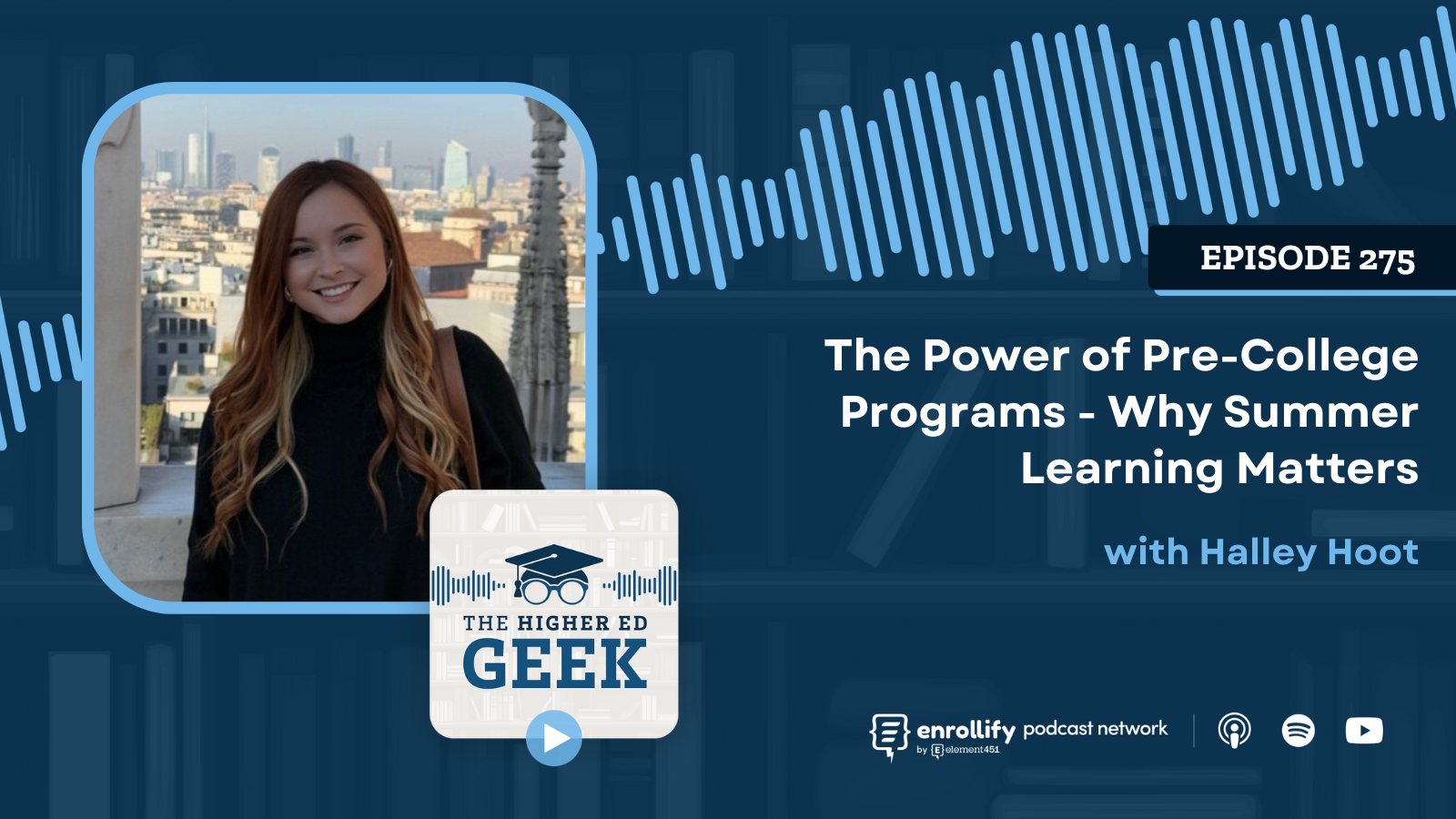About the Episode
About the Episode: The use of audio content in courses is an exciting and relatively newer way to diversify the delivery of learning experiences, and builds upon the current momentum of podcasting. Adrienne shares how she got into this space and the advice she has for professionals looking to dive in. She also shares what she’s seeing on the horizon from her vantage point as a faculty member.
Key Takeaways
- Audio Content Humanizes Learning: Podcasts offer authentic, engaging conversations that connect students to diverse perspectives and real-world insights.
- Accessible and Flexible Learning: Audio content allows students to learn on their own schedule—listening during commutes, while working, or at double speed.
- Innovative Teaching Approaches: Podcasting enables faculty to bring in guest experts without logistical or financial hurdles, broadening exposure to diverse voices.
- Skills and Digital Literacy: Faculty who embrace new media gain valuable skills while modeling lifelong learning for students.
- Content Versatility: Audio recordings can be paired with transcriptions, video interviews, and supplementary resources for a multimodal learning experience.
Episode Summary
How did Adrienne start using podcasts as a teaching tool?
Dr. Adrienne Trier-Benick, a sociology professor, wanted to bring real-world experts into her classroom to connect gender, pop culture, and society in meaningful ways. After realizing that organizing speaker events on campus was costly and time-intensive, she turned to podcasting. She launched Most Popular, a podcast series featuring scholars, nonprofit leaders, and professionals discussing pop culture's impact on society.
Adrienne began with basic tools—using Zoom for recording, Audacity for editing, and Canva for graphics—learning as she went. Starting small, she invited a few colleagues as initial guests and tested the podcast as an assignment for her students. The response was overwhelmingly positive: students loved the content and began suggesting topics and experts themselves.
Why does podcasting resonate with students?
Students respond well to podcasts because they’re accessible, engaging, and relatable. Adrienne emphasized the following benefits:
- Connection to Real-World Experts: Students hear directly from diverse experts, such as anthropologists, nonprofit leaders, and cultural analysts, making the content relatable and engaging.
- Flexible Learning: Students can listen at their own pace—during their commutes, chores, or downtime—and even at double speed for efficiency.
- Humanized Learning: Audio brings a conversational tone that textbooks can’t replicate, fostering deeper connections and interest in the material.
- Diverse Representation: By featuring guests from different backgrounds and perspectives, podcasts help students see themselves in academic and professional spaces.
For example, Adrienne shared how an episode with a hip-hop anthropologist who freestyled at the start became her most popular podcast. This approach merges academic analysis with cultural relevance, capturing students’ attention and interest.
What advice does Adrienne give for creating podcasts for learning?
Adrienne encourages educators to explore podcasting as a tool to enhance teaching and connect with students. Her key advice includes:
- Start Small: You don’t need a big budget—simple tools like Zoom, Audacity, and Canva can get you started. Focus on learning as you go.
- Bring in Diverse Voices: Podcasts are a powerful way to feature guests with different lived experiences, expertise, and perspectives that resonate with students.
- Think About Accessibility: Use transcription software to provide transcripts for ESL students and learners with disabilities. Tools like Google Docs and Otter.ai make this easy.
- Lean Into Your Passions: Focus on topics that excite you. This energy will translate into engaging conversations that your students will appreciate.
- Don’t Overthink It: Students value authentic, real conversations. Start with people you know and build outward from there.
Adrienne also reminded educators that trying something new—like podcasting—provides an opportunity to model lifelong learning for students. Even starting from zero can result in a transformative project with real impact.
Guest Social Handles: Website, LinkedIn
About the Show: The Higher Ed Geek Podcast explores the impact of edtech on the student experience by speaking with diverse leaders from institutions, companies, and nonprofit organizations. Each week we aim to provide an engaging, fun, and relevant dose of professional development that honors the wide range of work happening all across the higher ed ecosystem. Come geek out with us! The Higher Ed Geek Podcast is hosted by Dustin Ramsdell and is a proud member of the Enrollify Podcast Network.
Guest Bio: Adrienne Trier-Bieniek, Ph.D. is the author and editor of several books focused on pop culture including Sing Us a Song Piano Woman: Female Fans and the Music of Tori Amos (2013 Scarecrow Press), Fan Girls and Media: Consuming Culture (Rowman and Littlefield, 2015) , Feminist Theory and Pop Culture: 2nd Edition (Brill, 2019) and Gender and Pop Culture: A Text-Reader: 2nd Edition. (Brill, 2019) Her education-focused podcast, Most Popular, has grown a modest following, been a featured podcast for several platforms, and was detailed in the journal Radio Journal, a publication she has also guest-edited. Her research can be found in Radio Journal, Qualitative Research and Humanity and Society as well as several book chapters. Additionally, she has been featured in The New York Times, The Washington Post, Glamour Magazine, USA Today, NPR France, The Tampa Bay Times, and has been a consultant for Reuters, Canadian Broadcasting Company, NPR France, and The Independent. She has been a guest columnist for The Orlando Sentinel and HuffPo. She is currently a professor of sociology at Valencia College in Orlando, Florida.







-2.png)







